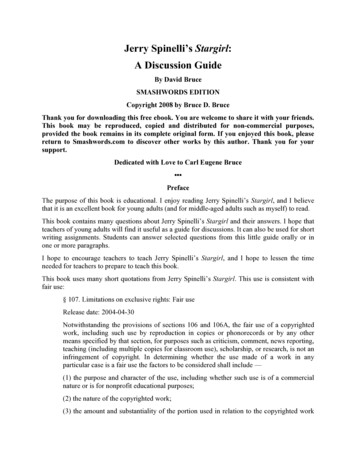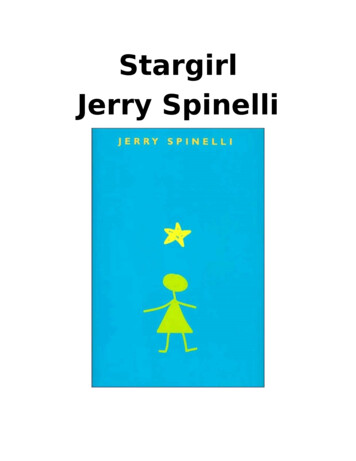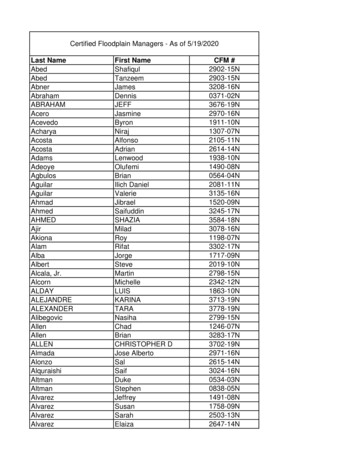
Transcription
J E R R YS P I N E L L IL O S E R
Pop
Contents1. You Grow Up12. The Bright Wide World33. Win54. Zinkoff’s First Day85. All Aboard136. A Wonderful Question187. Jabip288. Two New Friends349. Champions!4210. Atrocious5011. Mailman6012. The Nine Hundred Block of Willow7113. Waiting7814. The Furnace Monster8415. Discovered9416. Field Day10117. What the Clocks Say109
18. Best Friend11919. The Candy in His Hand12720. Nowhere13321. Something Hard and Thorny14322. Boondocks Forever15423. Vanished16124. Snow17025. “Claudia ”17726. What a Kid Is18127. Himself18728. Grounded19729. Still There20630. “Zinkoff”211About the AuthorPraiseOther Books by Jerry SpinelliCreditsCoverCopyrightAbout the Publisher
1 . You Grow UpYou grow up with a kid but you never reallynotice him. He’s just there—on the street, theplayground, the neighborhood. He’s part of thescenery, like the parked cars and the green plasticcans on trash day.You pass through school—first grade, secondgrade—there he is, going along with you. You’renot friends, you’re not enemies. You just crosspaths now and then. Maybe at the park playgroundone day you look up and there he is on the otherend of the seesaw. Or it’s winter and you sled tothe bottom of Halftank Hill, and you’re trudgingback up and there he goes zipping down, his armsout like a swan diver, screaming his head off. Andmaybe it annoys you that he seems to be havingeven more fun than you, but it’s a one-secondthought and it’s over.
You don’t even know his name.And then one day you do. You hear someonesay a name, and somehow you just know that’swho the name belongs to, it’s that kid.Zinkoff.2
2 . The Bright Wide WorldHe is one of the new litter of boys tossed up by thisbrick-and-hoagie town ten miles by trolley from acity of one million. For the first several years theyhave been home babies—Zinkoff and the others—fenced in by walls and backyard chain-link and,mostly, by the sound of Mother’s voice.Then comes the day when they stand aloneon their front steps, blinking and warming in thesun like pups of a new creation.At first Zinkoff shades his eyes. Then he lowershis hand. He squints into the sun, tries to outstarethe sun, turns away thrilled and laughing. Hereaches back to touch the door. It is something hewill never do again. In his ears echo the thousandwarnings of his mother: “Don’t cross the street.”There are no other constraints. Not a fence insight. No grown-up hand to hold. Nothing but3
the bright wide world in front of him.He lands on the sidewalk with both feet andtakes off. Heedless of all but the wind in his ears,he runs. He cannot believe how fast he is running.He cannot believe how free he is. Giddy withfreedom and speed, he runs to the end of theblock, turns right and runs on.His legs—his legs are going so fast! He thinksthat if they go any faster he might begin to fly. Awhite car is coming from behind. He races the car.He is surprised that it passes him. Surprised but notunhappy. He is too free to be unhappy. He waves atthe white car. He stops and looks for someone tolaugh with and celebrate with. He sees no one, sohe laughs and celebrates with himself. He stompsup and down on the sidewalk as if it’s a puddle.He looks for his house. It is out of sight. Hescreams into the never-blinking sun: “Yahoo!”He runs some more, turns right again, stopsagain. It occurs to him that if he keeps turningright he can run forever.“Yahoo!”4
3 . WinSooner or later the let-loose sidewalk pups willcross the streets. Running, they will run intoeach other. And sooner or later, as surely as nosesdrip downward, it will no longer be enough tomerely run. They must run against something.Against each other. It is their instinct.“Let’s race!” one will shout, and they race. Fromtrash can to corner. From stop sign to mail truck.Their mothers holler at them for running inthe streets, so they go to the alleys. They takeover the alleys, make the alleys their own streets.They race. They race in July and they race inJanuary. They race in the rain and they race inthe snow. Although they race side by side, theyare actually racing away from each other, siftingthemselves apart. I am fast. You are slow. I win.You lose. They forget, never to remember again,5
that they are pups from the same litter.And they discover something: They likewinning more than losing. They love winning.They love winning so much that they find newways to do it:Who can hit the telephone pole with a stone?Who can eat the most cupcakes?Who can go to bed the latest?Who can weigh the most?Who can burp the loudest?Who can grow the tallest?Who is first . . . first . . . first . . . ?Who?Who?Who?Burping, growing, throwing, running—everything is a race. There are winners everywhere.I win!I win!I win!The sidewalks. The backyards. The alleyways.The playgrounds. Winners. Winners.6
Except for Zinkoff.Zinkoff never wins.But Zinkoff doesn’t notice. Neither do theother pups.Not yet.7
4 . Zinkoff’s First DayZinkoff gets in trouble his first day of school.In fact, before he even gets to school he’s introuble. With his mother.Like the other neighborhood mothers of firstday, first-grade children, Mrs. Zinkoff intends towalk her son to school. First day is a big day,and mothers know how scary it can be to a sixyear-old.Zinkoff stands at the front window, looking atall the kids walking to school. It reminds him ofa parade.His mother is upstairs getting dressed. Shecalls down, “Donald, you wait!” Her voice is firm,for she knows how much her son hates to wait.By the time she comes downstairs, he’s gone.She yanks open the door. People are streaming by. Mothers hold the hands of younger kids8
while fourth- and fifth-graders yell and run andrule the sidewalks.Mrs. Zinkoff looks up the street. In the distance she sees the long neck of a giraffe pokingabove the crowd, hurrying along with the others.It’s him. Must be him. He loves his giraffe hat.His dad bought it for him at the zoo. If she hastold him once, she has told him fifty times: Donot wear it to school.The school is only three blocks away. He willbe there before she can catch him. With a sigh ofsurrender she goes back into the house.The first-grade teacher stands at the doorway asher new pupils arrive. “Good morning . . . Goodmorning . . . Welcome to school.” When she seesthe face of a giraffe go by, she nearly swallows hergreeting. She watches the giraffe and the boyunder it march straight to a front-row desk andtake a seat.When the bell rings, the teacher, Miss Meeks,shuts the door and stands before the desk of theunusually hatted student. The other students are9
openly giggling. She wonders if this boy is goingto be a problem. This is Miss Meeks’s year toretire, and the last thing she needs is a troublesome first-grader.“That’s quite a hat you have there,” she says.It is in fact remarkably lifelike.The boy pops to his feet. He beams. “It’s agiraffe.”“So I see. But I’m afraid you’ll have to take itoff now. We don’t wear hats in the classroom.”“Okay,” he says cheerfully. He takes off the hat.“You may be seated.”“Okay.”He seems agreeable enough. Perhaps he willnot be troublesome after all.Now she has to tell him that he cannot keepthe hat with him. She hopes he won’t break outbawling. First-graders can be so unpredictable.You never know what might set them off.She tells him. She keeps an eye on his lowerlip, to see if it will quiver. It does not. Instead hepops to his feet again and brightly chirps, “Yes,ma’am,” and hands the hat to her.10
Yes, ma’am? Where did that come from? Shesmiles and whispers, “Thank you. Down now.”He whispers back, “Yes, ma’am.”Twenty-six heads turn to follow her as shecarries the three-foot hat to the cubbyholes atthe back of the room. She labeled the cubbies theday before, and now she suddenly realizes shedoesn’t know which one belongs to the boy. Sheturns. “What’s your name, young man?”He jumps to attention and belts at full voice,“Zinkoff!”She has to turn her face to keep from laughing out loud. In all her thirty years of teaching,she has never known a student to announce himself or herself in such a manner.She turns back to him and gives a slight bow,which somehow seems to be called for. “Thankyou. And no need to shout, Mr. Zinkoff. Do youhave a first name?”The class is atwitter.“Donald,” he says.“Thank you, Donald. And you may keep yourseat. There is no need to rise when you speak.”11
“Yes, ma’am.”The cubbies, as the classroom seating soonwill be, are in alphabetical order. She goesstraight to the last cubbyhole and inserts thegiraffe. The space is not deep enough to hold itall. It looks as if a baby giraffe is napping in there.The thought comes to her that Donald Zinkoff,in more ways than cubbyholes, will always beeasy to find.12
5 . All AboardMiss Meeks stands at the head of the class and forthe thirty-first and last time gives her famousopening day speech:“Good morning, young citizens . . .”It pleases her to think that many years downthe road a student or two might recall that MissMeeks called them “young citizens” in the firstgrade. She feels that America’s children arebabied a bit too much and way too long.“Welcome to your first day at John W.Satterfield Elementary School. This is a big,big day for you. Not only is it the first day ofthe school year, it is the first day of twelveschool years. Hopefully, twelve years from now,every one of you will graduate from highschool. That sounds like forever from now,doesn’t it?”13
A sea of nodding heads, as always.“But it will come. Twelve years from nowwill surely come, and you will have learned howto write a topic sentence. And how to solve anequation. And even how to spell the word . . .”she pauses dramatically, she opens her eyes wideas if seeing the wonderful future . . . “tintinnabulation.”Audible gasps come from the sea of wideeyed, oh-mouthed faces. A few shake their headsin vigorous denial. She sneaks a peek at DonaldZinkoff. He alone is grinning, giggling actually,as if he has been tickled.“By the time you graduate from high school,many of you will already be driving cars andholding jobs. You will be ready to take yourplaces in the world. You will be ready to travel allthe way across the country by yourself, if youwish. Or to another country. You will be ready tobegin your own families.“What a wonderful adventure it will be! Andit all begins here. Right now. Today. It will be ajourney and an adventure of many days.” She14
pauses. She holds out her arms. “‘How manydays?’ you ask.”Several hands shoot up. She knows if sheanswers them, someone will knock her wholepoint out of whack with a guess in the millions.She ignores them. She goes to the board. With anew-year, crisply cut length of chalk, she writesin large numbers on the green slate:180“That,” she says, “is the number of days weare required to be in school each year.”She turns back to the greenboard. Under the180 she writes:x12“That is the number of years you will attendschool. Now let’s multiply.”She does the math on the greenboard, writingthe numbers slowly, grandly:15
180x123601802160She points to the bottom number. “There itis.” She taps the greenboard twice with the chalk.“Two thousand one hundred and sixty. The daysof your journey. That is how long your adventurewill last. Every one of those days will be anopportunity to learn something new. Just imaginehow much you can learn in two thousand onehundred and sixty days!”She pauses to let them imagine.“Two thousand one hundred and sixty adventures. Two thousand one hundred and sixtyopportunities to become whatever you want tobecome. This is what you’ve been waiting sixyears for. This is the day it begins.”She wishes she had a camera.16
She looks at the clock above the door. Sheacts surprised. “Oh my goodness! Look at that!Time is passing! Before you know it, there willonly be two thousand one hundred and fifty-ninedays left. Our first day is passing by and wehaven’t even learned a thing yet! What do yousay we get this learning train started?”She reaches into her desk drawer and pullsout the old, navy blue train conductor’s cap. Forthe thirty-first and last time she puts it on. Shepumps her hand twice. “Toot! Toot! All aboardthe Learning Train! First stop, Writing My OwnName! Who’s coming aboard?”Twenty-six hands shoot into the air. AndZinkoff, jumping to his feet so fast that he knockshis desk over with a nerve-slapping racket,thrusts up his hands and bellows to the ceiling:“YAHOO!”17
6 . A Wonderful QuestionDonald ZinkoffBefore arriving in first grade, he has learned hisletters. Some of them, anyway. And of course hehas seen his name from time to time. But he hasnever traced it on see-through paper. He hasnever tried to copy it, has never hitched a ride ona pencil point, feeling the shape and movementof his name’s letters.Do nNow, as he moves the pencil across the bluelines of the paper, he feels a thrill. He stares at hisname, and it is as if he is staring at himself. As ifthe Donald Zinkoff that was born six years agois here and now, by his own hand, in some smallway being born all over again.18
He rushes up to the teacher. He shoves thepaper in her face. “Look! It’s me!”She takes the paper. At the top is his name asshe has spelled it out for him to copy, as she hasdone for all of the students. Below that is his ownattempt. If she didn’t know what it was supposedto say, she could never read it. The confusion ofpencil lines on the paper makes no more sensethan the playpen doodlings of a two-year-old.The joy streaming up from his face makes hersmile. She lays a hand on his shoulder. “To beperfectly precise about it,” she says, “it is not you,it is your name. Your name is very important. Itrepresents you.”“What does ‘represents’ mean?” he says.“That means it takes your place. It sort ofsubstitutes for you. Even when you yourself arenot in a particular place, your name can be there.And so it’s important to write it properly.” Shehands the paper back to him. “And to write itproperly, you must practice. Use both sides.”A hundred sides would not have made a difference. Collecting papers before recess, she19
discovers that she still cannot read DonaldZinkoff’s name. Of itself, this is no big deal. Hecertainly isn’t the first sloppy handwriter she hascome across. In the past she has had straight Astudents who could not seem to write a legibleword. On the other hand, sometimes poor penmanship indicates a problem with motor skills.For the boy’s sake, she hopes he is simply sloppy.Recess!At exactly 10A.M.Zinkoff bursts onto theplayground with the other Satterfield first-,second- and third-graders. For the first minutehe is disappointed. He expected recess to besomething different, something new. It turns outto be simply free time. Recess turns out to be justanother name for life as he has always known it.Only shorter. His first recess lasted six years.This one is fifteen minutes. He means to makethe most of it.He dashes back into school. No one stops him.No one sees him. No one has ever run back intoschool during recess. He pulls his giraffe hat from20
the cubbie and runs back out to the playground.“Hey, there he is!” someone shouts. “The kidwith the hat!”In seconds there’s a crowd around him, kidsreaching up to touch the hat, kids calling, “Can Iwear it?”And then the hat is gone, snatched from hishead. A boy has it, he’s running off with it, jamming it onto his own head. Now other hands arereaching, grabbing, snatching. The hat goesfrom head to head. The kids are screaming,laughing. A second-grader runs off with it. Hegoes galloping around the playground. Thebrown and yellow hat bobs on his head like a realgiraffe. Zinkoff laughs aloud. He enjoys the spectacle so much that he forgets the hat is his.And then a tall red-haired boy, a fourth-grader,stands in front of the galloper, holding out hishand. The second-grader takes off the hat andhands it over. The red-haired fourth-graderlooks at the hat carefully. Instead of putting it onhis head, he sticks his arm into it, all the way upto his shoulder. With his fingers inside the head,21
he makes the giraffe nod and seem to talk. Hewalks over to one of his equally tall friends. Hemakes the giraffe’s mouth clamp onto his friend’snose. Everybody laughs. Zinkoff laughs. Eventhe recess-duty teacher laughs.The boy turns to the first-graders, who arekeeping their distance. “Whose hat is this?”Zinkoff runs forward. He trips over a foot andfalls flat on his face. Everybody laughs. Zinkofflaughs. He comes up to the tall red-haired boy.He stands much closer than a first-grader normally gets to a fourth-grader. He looks directlyup into the tall boy’s face and proudlyannounces, “It’s my hat.”The boy smiles. He shakes his head slowly.“It’s my hat.”Zinkoff just stares up. He is fascinated by theboy’s face. He has never seen a face smile andshake itself no at the same time.And he realizes that apparently there has beena mistake. Perhaps the tall boy was at the zoo onthe same day Zinkoff was there. Perhaps hebought the giraffe hat first and left it behind by22
mistake. Whatever, there is no mistaking whatthe boy said: “It’s my hat.”Zinkoff is sad. He has really come to love thehat that he thought was his. But he is not sad too,because he can tell how happy it makes the tallboy to get his hat back.The boy is still smiling down at him. Zinkoffalready knows that smiles do not like to be alone,so he sends his best smile up to join the oneabove. “Okay,” he says cheerfully.The smile on the tall boy’s face twists andchanges. Zinkoff does not know it, but he has justcheated the boy. The boy expected Zinkoff tomake a fuss, to try to get his hat back, maybeeven to cry or pitch a fit. The boy loves to seefirst-graders pitch fits. It’s fun. And now he ischeated of his fun, cheated by this smiling, agreeable little insect in front of him.The tall boy takes off the hat. He pokesZinkoff in the forehead with one of the giraffe’shorns. “It’s not mine, you dummy.” He wags hishead and snickers. He turns to his friends. “Firstgraders are so dumb.” His friends laugh. He23
throws the hat to the ground. As he walks off, hemakes sure to step on it.Zinkoff picks up the hat. Pieces of grit clingto the fuzzy surface. Suddenly the tall boy turnsand looks back. Zinkoff drops the hat in case theboy wishes to step on it again. But the boy onlylaughs and goes away.Zinkoff’s mother is waiting for him after school.All the way home he jabbers about his incrediblefirst day.“Do you like your teacher?” she asks him.“I love my teacher!” he says. “She called us‘young citizens’!”She pats the top of his hat, which makes himalmost as tall as her. “One thousand congratulations to you.”He beams. “Do I get a star?”“I believe you do.” His mother always carrieswith her a plastic Baggie of silver stars. She takesone out, licks it and presses it onto his shirt.“There.”As he bows his head to look at the star, the hat24
topples from his head. His mother picks it up.She puts it on her own head. Zinkoff howls andclaps. She wears it the rest of the way home.Later Zinkoff sits on the front step waitingfor his father to come home from work. Hisfather is a mailman. He walks all day on his jobbut drives to and from the post office in hisclunker. The Zinkoffs cannot afford a new car, soMr. Zinkoff buys used ones. Every time he buysone he gets excited. “She’s a real honeybug,” hesays. And then, a month or two later, every time,the honeybug starts to go bad. A retread tireloses its rubber. The carburetor starts coughing.The belts break. He keeps patching it up withduct tape, baling wire and chewing gum. Prettysoon everything is patches except Mr. Z’s faith inhis honeybug.The day always comes when Mrs. Z whispersto her son, “It’s another clunker.” Zinkoff gigglesand nods, but he never says the word “clunker”to his father, as that might hurt his feelings. It isnever long after Mrs. Z says “clunker” that the25
car dies, usually on a rainy morning on the way towork. The car simply refuses to move another inchover the face of this earth, and even Mr. Z knowsthat it is beyond the help of even a thousand newplugs of chewing gum. The next day he gets rid ofit and begins shopping for a new honeybug.This cycle has happened four times so far, whichis why Zinkoff mother and son, between the two ofthem, call the current car “Clunker Four.”Zinkoff hears Clunker Four long before hesees it. It makes a high squeal that reminds himof elephants in the movies. He runs to the curbas the car rounds the corner and rattles to a stop.As usual there is a smell of something burning inthe air. “Daddy,” he cries out, jumping into hisfather’s arms, “I went to school!”“And a star to prove it,” says his father, hoisting him into the house.Zinkoff talks about his first day at the dinnertable and after dinner and right up until bedtime.As always, the last thing his mother says to him atnight is, “Say your prayers.” While she hides hisgiraffe hat in the trunk with the comforters and26
fancy tablecloth, Zinkoff transfers the star fromhis school shirt to his pajamas. He climbs intobed and tells God all about his first day. Then hetells the stars.At this time in his life Zinkoff sees no differencebetween the stars in the sky and the stars in hismother’s plastic Baggie. He believes that stars fallfrom the sky sometimes, and that his mother goesaround collecting them like acorns. He believesshe has to use heavy gloves and dark sunglassesbecause the fallen stars are so hot and shiny. Sheputs them in the freezer for forty-five minutes, andwhen they come out they are flat and silver andsticky on the back and ready for his shirts.This makes him feel close to the unfallen starsleft in the sky. He thinks of them as his nightlights. As he grows drowsy in bed, he wonderswhich is greater: the number of stars in the sky orthe number of school days left in his life? It’s awonderful question.27
7 . JabipHere is the surprise: Every day is like the first dayto Zinkoff. Things keep happening that rekindlethe excitement of the first day. Learning to readhis first two-syllable word. Making a shoe-boxscene about the Pilgrims. Counting to five inSpanish. Learning about water and ants and toothdecay. His first fire drill. Making new friends.At the dinner table Zinkoff tells his parentsabout his days. But he always waits for hisfather’s question. “So, what’s new, Chickamoo?”Or “What’s new, Boogaloo?” Or “Kinkachoo.”Or “Pookypoo.” Many things tickle Zinkoff, butnothing more than the sound of a funny word.Words tickle him like fingertips in the ribs. Everytime his father comes up with a new one, Zinkoffhas to put down his fork and laugh. Usually heleans to one side, as if the funny word has the28
force of a great wind. Sometimes he even falls offhis chair.It’s his teacher, Miss Meeks, who comes upwith the best one. She stands at the greenboardone day, trying to explain what a billion basketballs would look like. “If you put the first onehere,” she says, pointing to the floor, “and linethem up out the door and down the hallway andacross the playground and down the street—why,they would stretch from here to Jabip!”The classroom is a sea of boggling eyes.Wow!Someone calls out, “Where’s Jabip?”Miss Meeks explains that there is no actualplace called Jabip. It’s just her way of sayingsomeplace really far away.At that point Zinkoff, in the last seat in thelast row, tilts alarmingly to the left and falls fromhis chair. The teacher rushes to him. His face isred. Tears stream down his cheeks. He’s gaspingfor breath.“Donald! Donald!” she calls, though he isinches away.29
He looks up at her through watery eyes. Hegasps, “Jabip!” He pounds the floor.That’s when Miss Meeks realizes her pupilisn’t dying, he’s merely laughing.It’s a good five minutes before Zinkoff calmsdown enough for the class to continue. MissMeeks forbids the class—and herself—to utterthe word “Jabip” for the rest of the day.Nevertheless, from time to time there are suddengiggly eruptions from the back row as the wordpops back into Zinkoff’s head.When he hears Clunker Four coming thatday, he runs alongside the car as it coasts to thecurb. “Daddy! Daddy! Did you ever hear ofJabip?”“Sure,” says his father out the open window.“I also heard of Jaboop.”Zinkoff rolls on the sidewalk. Jabip. Jaboop.He keeps erupting through dinner. Eatingbecomes hazardous. His parents smile patientlyfor the first minute or so, then begin telling himenough is enough. But Zinkoff can’t stop. Whena bolt of mashed potatoes shoots from his nose,30
he is sent to his room. That night he gigglesthrough his prayer and into sleep.In school for the rest of the week Zinkoff continues to produce outbursts of laughter in theback row. Every outburst triggers laughter fromthe other pupils. Sometimes, to get him started,a pupil waits until the teacher’s head is turned,then whispers the forbidden word. SometimesMiss Meeks bites her tongue to keep from joining in, sometimes she gets mad.It’s during one of the mad times that she says,“Donald, come up here, please.” When he standsbefore her she takes something from her deskdrawer. It’s a round yellow button. It’s the largestbutton the students have ever seen, as large as agiant pinwheel taffy. It has black letters on it.“Can you tell me what it says?”Zinkoff studies the button. Finally he shakeshis head.“It says, ‘I know I can behave.’” She pins thebutton onto his shirt. “And I know you can.”Zinkoff has to wear the button for an hour.During that time he does not laugh once. Miss31
Meeks judges her maneuver a success and returnsthe button to the drawer. Soon Zinkoff is laughing again. He gets the button back.So it goes for several days. Second-graderswho wore the button the previous year and whohave heard of Zinkoff’s endless giggling ask him inthe playground, “Did you get the button today?”One day Miss Meeks has to leave the classroom for a while. When she returns she findsZinkoff’s hand waving in the air.“Yes, Donald?”“Miss Meeks,” he says, “I laughed when youwere gone.”And she realizes at last that for Zinkoff thebutton is not a punishment at all, but a badge ofhonor. From then on she punishes him by keeping the button in the drawer.Button or no button, Zinkoff loves school. Oneday he awakes before anyone else in the house.He gets himself dressed. He makes his ownbreakfast. He brushes his teeth and walks off toschool. I must be early, he thinks, for he sees no32
crossing guards or other children along the way.He is sitting on the front step waiting for thedoor to open when he hears Clunker Four. Itstops in front of the school and out pop both hismother and father. Both come running.“Donald, we’ve been looking all over! Youweren’t in your bed!”“I came to school all by myself,” he declaresproudly.His parents look at each other. His motherbites her lip. His father picks him up and says,“You’re very big to do that all by yourself. Theonly problem is, there’s no school today. It’sSaturday.”When Miss Meeks passes Zinkoff on to secondgrade, she writes on the back of his final reportcard: “Donald sometimes has a problem withself-control, and I wish he were neater, but he isso good-natured. That son of yours is one happychild! And he certainly does love school!”33
8 . Two New FriendsIn the summer between first and second gradesZinkoff acquires two new friends. One is a babysister, the other is a neighbor. The baby sister isPolly. The neighbor is Andrew.When Zinkoff first meets the baby, his mothersays, “Look,” and pulls down the blanket. Zinkoff’seyes boggle.There are two silver stars on the baby’sdiaper. This baby is less than one day old. Whatcan she have done already to deserve two stars?He’s never been awarded more than one at a time.“Mom,” he says, “two stars? What did she do?”“She did the best thing of all,” says his mother,pulling up the blanket. “She was born.”Has Zinkoff been misinformed? “I was borntoo, wasn’t I?”She pats his hand. “Absolutely. You wereevery bit as born as Polly was.”34
“So,” he says, “how come I didn’t get twostars?”“Who says you didn’t?”He brightens. “I did?”She shakes her head. “Sorry. I was kiddingyou. That was before I started giving out stars.”Now she needs to pick him up again. “Tell youwhat—how would you like your being-born starsnow? Better late than never.”He brightens again. “Yeah!”But she’s not finished thinking. “Or howabout this? We could make a deal. We could waituntil you’re having a really bad day, some daywhen you could really, really use two stars to pickyou up. That’s when you get them.”He thinks it over. He hates to wait, but heloves to make deals. “Okay,” he says and shakeshis mother’s hand. Then he reaches into theblanket and shakes the baby’s foot.A month later the new neighbors move in nextdoor. That same day Mrs. Zinkoff bakes a strawberry angel food cake and carries it out the front35
door. Her firstborn tags along. “This is how wesay welcome,” she says.He stands at his mother’s side as she rings thedoorbell and says, “Welcome to the neighborhood” and hands the cake to the new lady neighbor, whose proper name is Mrs. Orwell, butwhose first name is better: Cherise. Then he isintroduced. “This is my son, Donald.”Cherise smiles down at him and shakes hishand and says, “Hello, Donald. I have a son too.His name is Andrew. How old are you?”“Six,” he replies.“So is Andrew.”Zinkoff stares at the two ladies in wonder.“Wow! Same as me!” He looks past Cherise. “Ishe in there?”“He is,” says Cherise, “but he’s hiding. Hesays he’s never coming out. He’s mad because wemoved away from our other house.”Zinkoff thinks about this for a moment. Helifts a finger to Cherise. “I have an idea. TellAndrew my father is a mailman. That will makehim come out.” In Zinkoff’s view, carrying themail is the most interesting job there is.36
Cherise nods solemnly. “I’ll give it a try.”Before Zinkoff and his mother get back totheir own house, he has another idea. “I’m goingto
It’s him. Must be him. He loves his giraffe hat. His dad bought it for him at the zoo. If she has told him once, she has told him fifty times: Do not wear it to school. The school is only three blocks away. He will be there before she can catch him. With a sigh of surrender she goes back










